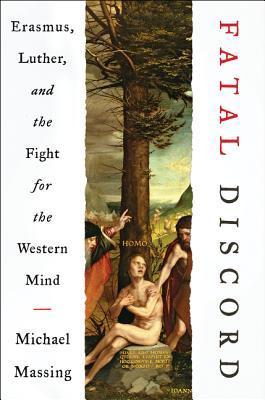
Fatal Discord
Erasmus, Luther, and the Fight for the Western Mind
کتاب های مرتبط
- اطلاعات
- نقد و بررسی
- دیدگاه کاربران
نقد و بررسی

Starred review from December 11, 2017
Massing (Now They Tell Us), a contributing editor for the Columbia Journalism Review, superbly accomplishes the mammoth task of writing a dual biography of Desiderus Erasmus (1466–1536) and Martin Luther (1483–1546) that places the pair within their historical context. Massing argues that the schools of thought represented by Erasmus and Luther—a pluralistic humanism and an evangelical religion, respectively—still shape Western religious and political thought today. Erasmus, a Catholic priest, lived in the Netherlands; his translation of the New Testament sparked a large debate around authorship and intent. Luther, a German monk, famously launched the Protestant Reformation. Massing writes an entertaining, briskly paced narrative that whisks readers among the Low Countries, Paris, Germany, and England to ground the story within the complex theological history that helped to shape the work and lives of Luther and Erasmus. Apart from a few small stumbles—Massing seems not to understand the significance of the “golden rose” sent to England’s King Henry VIII by the pope, for example, although he later correctly explains the same symbol sent to Elector Frederick—this is a masterly work. Massing manages to juggle the complicated biographies and life work of both Erasmus and Luther while giving the reader a well-written, comprehensive background of pre-Reformation theology.

February 1, 2018
Martin Luther (1483-1546) and Desiderius Erasmus (1466-1536) were two towering figures at the beginning of the modern era. They influenced each other, but also at times despised each other. In this dual biography, Massing (contributing editor, Columbia Journalism Review; Now They Tell Us) deftly treats the lives of both, setting them in the context of the times. The invention of movable type allowed the ideas of both men to spread widely and quickly, and religious controversies were at the center of their works. Both wanted to see biblical texts critically reexamined from a scholarly perspective, available in vernacular languages. Their teachings were also catalysts for some of the events that shaped the modern world: the development of nationalism, the peasant revolt, major changes in the practices of the Catholic Church. VERDICT As we commemorate the 500th anniversary of the Protestant Reformation, this engaging tale of the contentious relationship between two precursors of the modern world--one who remained a Catholic, the other whose teaching spawned the various Protestant denominations--provides much-needed historical background and reflection on a major period in church and world history.--Augustine J. Curley, Newark Abbey, NJ
Copyright 2018 Library Journal, LLC Used with permission.

Starred review from December 15, 2017
A riveting dual biography reveals the social, political, and religious tensions roiling 16th-century Europe.Massing (Now They Tell Us: The American Press and Iraq, 2004, etc.), a former executive editor of the Columbia Journalism Review and recipient of a MacArthur fellowship, focuses on the well-known rivalry between the Dutch humanist Desiderius Erasmus (c. 1467-1536) and the German reformer Martin Luther (1483-1546) to create a majestic, deeply informed portrait of their tempestuous times. Both men were revolutionaries, rebelling against the ethical and theological assumptions of the medieval world and the hierarchical, dissolute Catholic Church; each sought an authentic spiritual path to enlightenment and salvation. For Erasmus, performing "works of an ethical nature" was central to being "a pious Christian." For Luther, good works were "not just useless but dangerous--a self-seeking expression that imparted a false sense of security." Although both became monks, Erasmus was cosmopolitan and gregarious; Luther, provincial, harsh, and viciously anti-Semitic. Erasmus appealed "to reason, free will, and moral virtue"; Luther thundered that faith alone led to redemption. In their prolific writings, which gained wide readership from the burgeoning printing industry, they railed against rampant "papal, curial, and ecclesiastical excesses." Both offered their own translations of the Bible, accessible to common readers, an affront to clerical authority that incited the church's wrath. Luther went farther than Erasmus by condemning the church for collecting fees for performing rites, insisting on celibacy among the clergy, and selling indulgences. Disputation on the Power and Efficacy of Indulgences, made public in 1517 as the 95 theses, catapulted Luther to sudden fame--and also led to virulent attacks that dogged his life: his books were burned, and he was summoned to recant before judges at Worms. His "unflinching stand," Thomas Carlyle later wrote, "was the greatest moment in the Modern History of Men," setting the stage for English Puritanism, parliamentary government, the French Revolution, and modernity. Massing argues persuasively that the discordant views represented by the two men continue to shape Western culture.An impressive, powerful intellectual history.
COPYRIGHT(2017) Kirkus Reviews, ALL RIGHTS RESERVED.

Starred review from February 1, 2018
Firebrand of the Reformation, Martin Luther begins his ministry declaring, I follow Erasmus. In this riveting narrative, Massing recounts how the incendiary friar eventually quarrels with and finally repudiates his erstwhile leader, so sundering the church that Erasmus hopes to reform from within, and opening up a epoch-defining gap between Protestant evangelism and cosmopolitan humanism. Readers see how Erasmus' carefully annotated translation of the New Testament kindles in Luther a passionate faith that God's utterly sovereign grace redeems sinners without their choice, their works, or their rituals of penance. When that faith galvanizes Luther as a foe of ecclesiastical indulgences, church loyalists pressure Erasmus to denounce the rebel. Sharing his desire to end church corruption and disseminate vernacular scripture, Erasmus reluctantly breaks with Luther by repudiating his views on free will and classical scholarship. Though Erasmus' tolerant Christian humanism appears irrelevant during the century of religious bloodshed provoked by Luther's zeal, Massing discerns its partial reemergence in a twenty-first-century Europe united by a secular commitment to human rights, just as he recognizes Luther's abiding influence among America's conservative Protestants, who, in turn, will learn much from this account of the lasting transatlantic impact of the clash between Erasmus and Luther.(Reprinted with permission of Booklist, copyright 2018, American Library Association.)

























دیدگاه کاربران